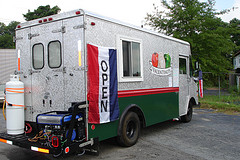CORRECTION APPENDED: The planning commission member quoted in this article is Linda Edmisten, not Lisa Edmisten as originally reported.
Food trucks could start setting up shop in downtown Raleigh and the Glenwood South district, despite resistance from restaurant owners.
At Tuesday’s Planning Commission meeting, commissioners approved a code change that will allow food trucks to park on private property. The change still requires full city council approval.
The new rules would require food trucks to park at least 100 feet from a restaurant or outdoor eating area and 50 feet from a food cart. The rules also regulate parking, permitting, and sanitation “in order to mitigate potential negative impacts,” according to the zoning staff report.
At a January council committee meeting, many restaurant owners spoke out against food trucks and the competition that they would bring, as well as issues that may be involved with them, such as trash disposal, parking, safety and traffic.

Photo by Steven Valentino
Steven Valentino, owner of Valentino’s Food Truck, said before “brick-and-mortars” complained, food trucks were allowed to set up freely outside of downtown, but now, there’s a lot of pressure on the city council to regulate trucks. He said the new limits on the permits will make it tougher for trucks to set up.
“We’re being looked upon as sort of a parasite,” Valentino said. “The city council is too close to the canvas and they’re not looking at the bigger issues.”
Downtown Raleigh Alliance Director David Diaz said that it has been difficult to mediate both sides of the issue.
Overall, Diaz feels that “the changes were headed in right direction.”
“And I say that in general because we’re still getting a significant amount of concern from merchants,” Diaz said. “Some don’t want it to happen at all regardless of what restrictions are put on it.”
The proposed regulations would also limit how many food trucks can park per acre: One truck per half-acre or less, two trucks on lots between one-half and one acre and three for lots between one and two acres. There is no maximum on lots that are more than two acres.
City officials hope that rule will prevent crowds and late night disturbances.
“That’s the attempt to address that concern,” said Greg Hallam with the city’s planning department.
Food trucks would not be allowed to have amplified sound or signs on sidewalks and would only be allowed to set up outdoor seating areas on lots of two acres of more.
Trucks would also not be allowed to occupy any parking spaces that are needed to meet the requirements for principal use of a property, according to the text change.
Hours for operation for trucks located 100 yards from a single-family or duplex home would be 7 a.m. to 10 p.m., as opposed to other areas, where a truck’s operation hours can be 6 a.m. to 3 a.m.
Hallam said both the property owner and vendor would have to get a zoning permit.
Planning Commission Vice Chair Linda Harris Edmisten, who opposed the changes, said they don’t provide enough protection against negative effects from the trucks.
“And mainly, since these are run by diesel emissions, and if they are running all day and all night within 150 feet of a single-family residence, that can be pretty unpleasant with smoke and vibrations and emissions and so on,” Edmisten said.
Valentino said if the new regulations take effect, the industry will probably get a little bigger in the downtown area, but there will still be pressures on vendors. He stressed that food trucks aren’t trying to steal business from restaurant owners and are trying to establish a “symbiotic relationship” with them.
“We’re just offering more takeout options,” he said.
